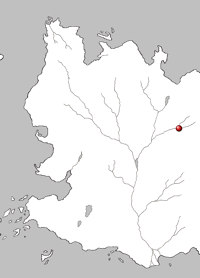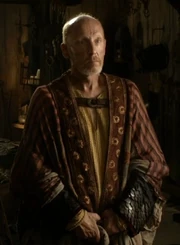- "The other Free Cities are known for what they make...Qohor, its smiths, who can reforge Valyrian steel..."
- ―Ser Jorah Mormont

Map showing the location of Qohor on the continent of Essos.

Tobho Mott, a Qohorik blacksmith living in King's Landing.
Qohor is one of the nine Free Cities in western Essos, located between the Narrow Sea and the grasslands held by the Dothraki. It is several weeks' ride east of Pentos on the western edge of the vast Forest of Qohor.[1]
Like most of the Free Cities (except for Braavos), Qohor was founded as a colony of the Valyrian Freehold, specifically as a religious center for worship of the deity known as the Black Goat.
People from Qohor are known as Qohorik. The city itself is renowned for its immensely skilled blacksmiths, who possess the rare knowledge of how to reforge Valyrian steel.[2]
Notable citizens
- Tobho Mott - a master blacksmith and armorer, who moved to King's Landing in Westeros many years ago.
History
Background
Soon after the Doom of Valyria, four hundred years prior to the War of the Five Kings, Valyria's outlying colonies were thrown into chaos. This period of civil wars between the Free Cities and invasions from without is remembered as the Century of Blood.
Without the Valyrians and their dragons to hold them in check anymore, mounted Dothraki hordes burst forth from the central plains of Essos, rampaging across the continent. Khal Temmo led his khalasar numbering in the tens of thousands towards Qohor, intending to raze the city completely. However, the horde was decisively defeated in the resulting Battle of Qohor by 3,000 Unsullied warrior-eunuchs purchased from Astapor in Slaver's Bay. Temmo himself as well as his sons were killed, and Qohor was saved.
Qohor is still the closest of the Free Cities to the Dothraki Sea, but ever since Temmo's defeat it has been guarded by a standing garrison of Unsullied purchased from Slaver's Bay.
Season 1
The khalasar of Khal Drogo passes close to Qohor during their journey to Vaes Dothrak. Ser Jorah Mormont takes advantage of their proximity to procure more supplies, but in reality, to also send word to Varys that Daenerys Targaryen is pregnant.[3]
Ned Stark visits the forge of the blacksmith Tobho Mott, a Qohorik master-armorer who moved to King's Landing many years ago.[4]
In the books
In the A Song of Ice and Fire novels, Qohor is the easternmost of the Free Cities. It lies beyond Pentos and Norvos, close to the edge of the Dothraki Sea. The city lies next to the vast woodland known as the Forest of Qohor. Situated on the Qhoyne, a tributary of the vast River Rhoyne, Qohorik warships control territory down its banks south to Dagger Lake.
As in most of the Free Cities, trade is a central part of the economy of Qohor. The city's earliest function was as a lumber camp, and the forest has always been the primary source of its wealth. Qohorik barges carry lengths of timber downriver to the towns and cities of the lower Rhoyne, including Volantis. Many types of animals can be found in the forest, their pelts valuable and highly prized. Silver, tin, and amber can also be found in the forest, and the artisans of Qohor produce high-quality wood carvings and fine tapestries.
Qohor is most famous, however, for its blacksmiths. The quality of metalwork produced in the city cannot be matched even by the finest smiths of Westeros. Qohor is also the only place in the known world where the knowledge of reforging Valyrian steel has been preserved. The secrets of this process are so zealously guarded that one Maester Pol, who resided in Qohor for several years, was exiled from the city three times- the last of which involved having his hand chopped off- for asking too many questions about it.
The primary deity worshipped in Qohor, the Black Goat, has a very negative reputation (the Bearded Priests of Norvos in particular consider it a demon). In the religion the Black Goat demands daily blood sacrifices at its temples: while animals such as calves, bullocks, and horses are typical sacrificial victims, on significant holy days condemned criminals make the march to the altar and face the knives of the priests. When the city is facing great danger, it is not unheard of for the nobility to offer up their own children in the hope that the Black Goat will offer its protection.
Qohor is an essential link in the trade routes that connect western and eastern Essos. Its position at the western edge of the Dothraki Sea makes Qohor the ideal starting point for merchant caravans traveling east across the grasslands to Vaes Dothrak, where they meet and trade with merchants who travel west from the distant lands beyond the Bones (the immense mountain ranges that runs from the northern to southern coasts of the continent), such as the empire of Yi Ti. By the same token, Qohor is the first of the Free Cities encountered by traders returning from Vaes Dothrak with exotic wares and spices from the Further East. Due to this frequent influx of foreign influences, Qohor has a more "exotic" feel than many of the other Free Cities.
"Qohor" is pronounced "Kwoh-hor", as opposed to "koh-hor".
Location
Qohor is shown in the incorrect location on the Season 2 Viewer's Guide map. This map has Qohor northwest of its proper location, on the wrong tributary of the Rhoyne (and much further away from the Forest of Qohor). However, the "Areas of Control" map for Season 2 puts Qohor in its correct location, matching that of the novels.
See also
Qohor on A Wiki of Ice and Fire (spoilers from the books)
References
Template:Regions of the Known World Template:FreeCities
